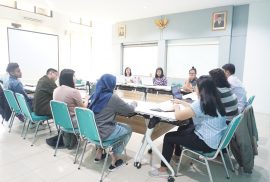The Center for Southeast Asian Social Studies (CESASS) Gadjah Mada University held an “Academic Writing” class for the interns on Thursday (02/27/2020) at the CESASS Library. As an academic-based institution, CESASS invites student interns to participate in learning the world of scientific writing.
Dr. Phil. Vissia Ita Yulianto, one of the researchers at CESASS was present as a speaker. Starting with an experience sharing session, Ita told the audiences that she had been in the writing world for a long time, starting with her love of writing. “Writing is a place to shed ideas and when writing I feel free,” she said.








